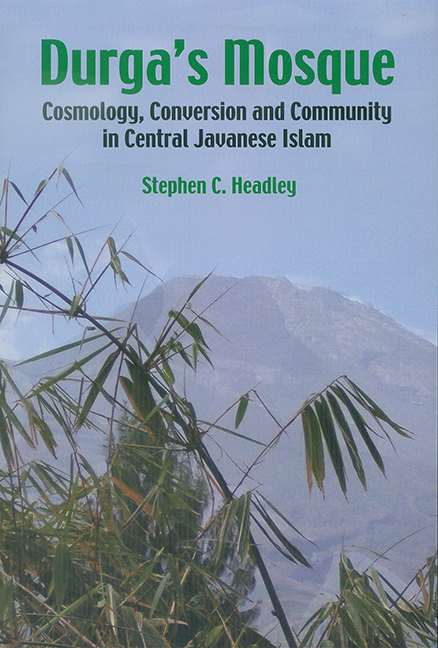Book contents
- Frontmatter
- Contents
- List of Figures
- List of Tables
- Preface
- Acknowledgements
- Introduction: Cosmology, Conversion and Community in Javanese Islam
- PART I THE SOCIOLOGY AND PRACTICE OF RELIGION IN CENTRAL JAVA
- 1 Of Palaces and Placentas: The Praxis of Javanese Kindred
- 2 The Village “Kingdom”: The Bed of Sri and the Realm of Sadana
- 3 Village Goddesses, Their Hierarchy and Clientele
- 4 Deterritorialization: The End of Peasant Livelihood
- PART II RECONSTRUCTION OF LOCAL RELIGIOUS HISTORY
- PART III INVOKING THE COSMOS, MAGNIFYING ALLAH: STRUCTURING A LANDSCAPE IN THE SEVENTEENTH TO NINETEENTH CENTURIES
- PART IV COSMOLOGY, CONVERSION AND COMMUNITY IN CENTRAL JAVANESE ISLAM TODAY
- Bibliography
- Index
- About the Author
4 - Deterritorialization: The End of Peasant Livelihood
from PART I - THE SOCIOLOGY AND PRACTICE OF RELIGION IN CENTRAL JAVA
Published online by Cambridge University Press: 21 October 2015
- Frontmatter
- Contents
- List of Figures
- List of Tables
- Preface
- Acknowledgements
- Introduction: Cosmology, Conversion and Community in Javanese Islam
- PART I THE SOCIOLOGY AND PRACTICE OF RELIGION IN CENTRAL JAVA
- 1 Of Palaces and Placentas: The Praxis of Javanese Kindred
- 2 The Village “Kingdom”: The Bed of Sri and the Realm of Sadana
- 3 Village Goddesses, Their Hierarchy and Clientele
- 4 Deterritorialization: The End of Peasant Livelihood
- PART II RECONSTRUCTION OF LOCAL RELIGIOUS HISTORY
- PART III INVOKING THE COSMOS, MAGNIFYING ALLAH: STRUCTURING A LANDSCAPE IN THE SEVENTEENTH TO NINETEENTH CENTURIES
- PART IV COSMOLOGY, CONVERSION AND COMMUNITY IN CENTRAL JAVANESE ISLAM TODAY
- Bibliography
- Index
- About the Author
Summary
HISTORICAL OVERVIEW
In the preceding chapter, it was claimed that the profoundly village-centred topos of the search for well-being was homologous to a larger, whole society, the difference lying in the circuit through which these similar values are passed. In the rural situation, a blessing is invoked for that particular place, whereas in the palace invocation society, incarnated in the ruler, is taken as a whole. Since the village perspective is so strongly rooted in an inhabited space, it is important to understand the evolution of the village communities in terms of their land tenure and taxation procedures. Without this, it is difficult to understand the transformation from membership in a village to a non-territorial community like the Javanese Muslim umat. Membership in the village involved many constraints. One could not leave the village and settle in another one since all able-bodied family heads and farmers, called cacah, were indebted to the ruler. The relationship of servant to master (kawula-gusti) was thus also economic. The king measured his resources in terms of numbers of these cacah. On the other hand the destiny of the village was perceived in large part as a communal one; local spirits protected the frontiers of that particular space and the residents who honoured its deities (dhanyang) at offering sites, sacred trees and wells, etc. The local ritual calendar involved the annual farming cycle as it related to these local deities. Communal meals were held, and communal labour was necessary for rebuilding houses and restoring bridges and wells. The king held no royal eminent domain (vorstelijk eigendomsrecht) over the village land; the local Javanese princes did not even measure these lands; what they did count was the number of farming families on them. They were preoccupied by sociology, not by territory measured in square metres of rice fields.
The apanage system in the central (nagaragung) lands, those closest to the king's palace, was controlled by the extended royal family. Relatives of the current and preceding kings parleyed their kinship relation as best they could into tax farming settlements (lungguh) and the cacah accorded them by the raja. The king, on the other hand, did not content himself with distributing rights to tax farming. He also exercised a monopoly on ritual genealogies leading back to the founders, both divine and human, of his dynasty.
- Type
- Chapter
- Information
- Durga's MosqueCosmology, Conversion and Community in Central Javanese Islam, pp. 163 - 194Publisher: ISEAS–Yusof Ishak InstitutePrint publication year: 2004



